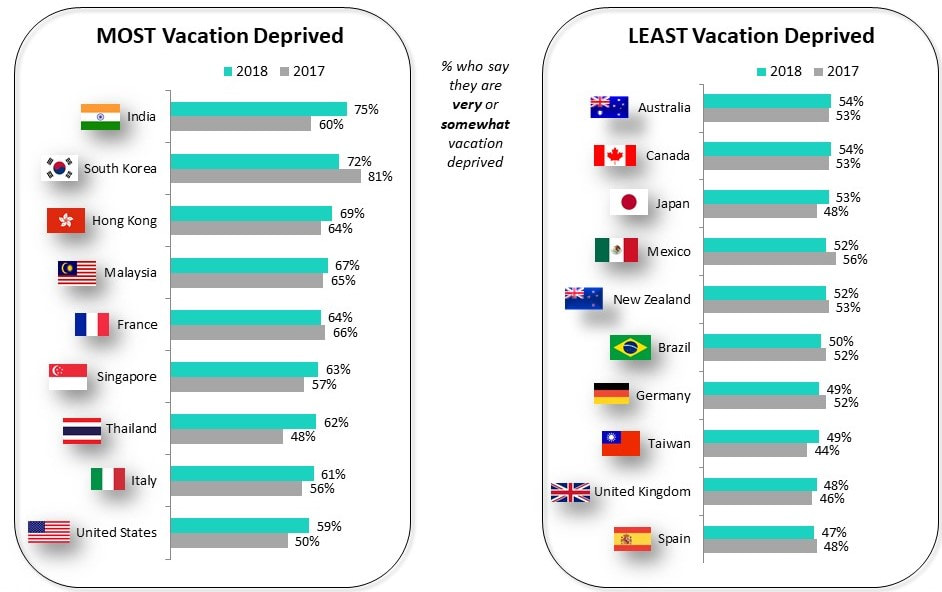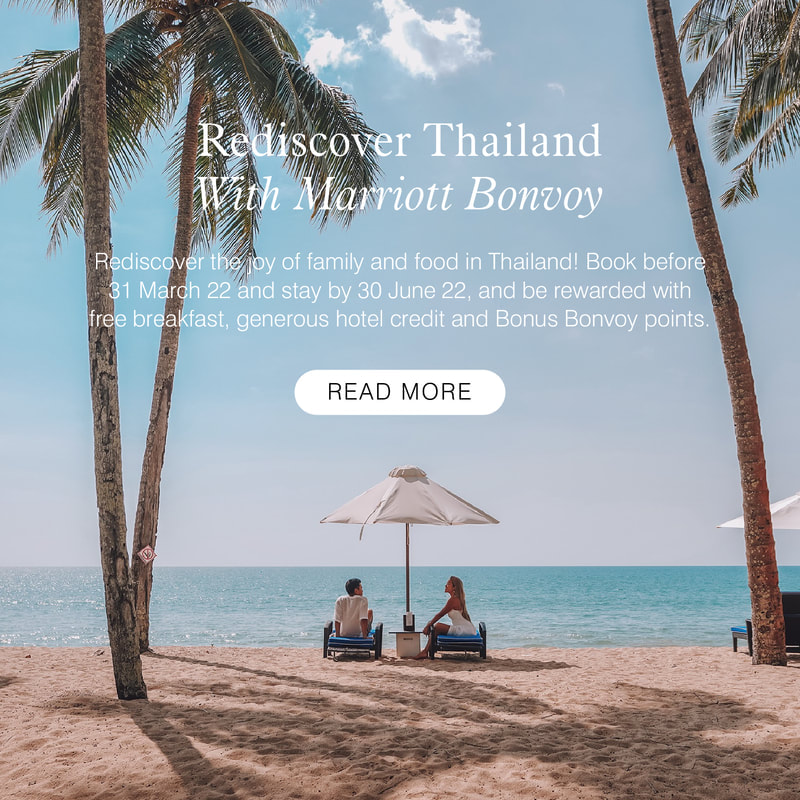Thais unplug better while on vacation, but 74% claim they would cancel a vacation due to work
Expedia.co.th released the results of its 18th annual Vacation Deprivation® study, which examines vacation usage and trends across 19 countries. The report found that global vacation deprivation is on the rise, and that workers in Thailand took the fewest number of vacation days in the world in 2018, alongside Japan and the U.S.
Incorporating insights from 300 full-time working adults in Thailand, the study revealed that 80 percent of Thais agree that they deserve more vacation days than they are given, ranking them fourth highest in Asia to express that, after Japan (54%), Hong Kong (86%) and India (82%).
Incorporating insights from 300 full-time working adults in Thailand, the study revealed that 80 percent of Thais agree that they deserve more vacation days than they are given, ranking them fourth highest in Asia to express that, after Japan (54%), Hong Kong (86%) and India (82%).
Top line results from the 2018 report include:
“Over the years we are starting to see more and more workers take short vacations, and this could be due to public holidays falling over a weekend, allowing for long weekend holidays. Thailand is a great example of that. While bigger trips are great, a quick break can drastically improve quality of life,” said Lavinia Rajaram, APAC Head of Communications for Brand Expedia.
“Fear of Switching Off” – is it all in our heads?
24 percent of Thais go six months or longer without a vacation, with more than a quarter (42%) going three to six months a year sans time off. Considering time off is so precious, one might be surprised to hear that almost a quarter (24%) of Thai workers admit to checking work email/voicemail at least once a day while on vacation.
While this behavior has stayed mostly consistent over the past decade, perhaps there’s hope for future generations – younger workers are the least likely to check in frequently, at 19 percent for 18-34-year-olds, compared to 31 percent of the 50 and over crowd.
Interestingly, the pressure to be available may be self-imposed – only a small number of respondents say their managers (17%), junior staff (10%) and clients (12%) expect them to check-in daily while on vacation, proving most people need to simply give themselves permission to unplug.
Even a short getaway boosts self-esteem and confidence
With the biggest barriers to vacation being financial (54%), the desire to bank vacation days (23%) and inability to get time off work (17%), it begs the question: how long does one need to get away to reap the benefits of vacation? The study uncovered good news for those scarce on funds or time:
Thais are savvy to this shortcut: 42 percent say they use short trips to fight off vacation deprivation in between longer getaways. To get the most out of a quick trip, try to keep travel time under four hours and choose accommodations close to the area’s main attractions.
Taking a mental break
The growing focus and conversation around mental health may be changing how Thai workers vacation. 35 percent of Thai respondents say they regularly take vacations where their primary goal is “mental wellness,” and they overwhelmingly feel that vacation is a chance to “hit the reset button” on stress and anxiety. Thai workers also report taking an average of two mental health days each year, which most feel should be considered vacation days (82%), rather than sick days (18%).
“A wellness-centric trip doesn’t have to mean a spa or yoga retreat, although those are popular options among Thais,” says Rajaram. “For most of us, recharging simply means we need to disconnect and slow down. Whether it’s a family vacation or a solo escape, set rules about how often you’re allowed to check email and try not to overschedule your days.”
Looking for holiday ideas and how to safe on your next trip, log on to Expedia Thailand Travel Blog.
- Even more popular then mental health days are vacation days used to take care of errands, schedule appointments, and get things done – something that two-thirds (67%) of workers around the world are doing. This phenomenon seems to be most common in developing countries like India (85%), Thailand (85%) and Brazil (84%).
- Consistent with 2017, most Asian countries have the hardest time leaving work behind when taking vacation. Asian countries also have the highest incidence of cancelling or postponing vacation plans due to work.
- Levels of Vacation Deprivation vary by industry, with those in Agriculture (71%), Marketing & Media (67%), along with Food & Beverage (64%) being the most vacation deprived.
- Top three reasons for Thai workers to not take a holiday are: Don’t know where to go (27%), saving up time for a long holiday (25%) and can’t get time off work (24%).
“Over the years we are starting to see more and more workers take short vacations, and this could be due to public holidays falling over a weekend, allowing for long weekend holidays. Thailand is a great example of that. While bigger trips are great, a quick break can drastically improve quality of life,” said Lavinia Rajaram, APAC Head of Communications for Brand Expedia.
“Fear of Switching Off” – is it all in our heads?
24 percent of Thais go six months or longer without a vacation, with more than a quarter (42%) going three to six months a year sans time off. Considering time off is so precious, one might be surprised to hear that almost a quarter (24%) of Thai workers admit to checking work email/voicemail at least once a day while on vacation.
While this behavior has stayed mostly consistent over the past decade, perhaps there’s hope for future generations – younger workers are the least likely to check in frequently, at 19 percent for 18-34-year-olds, compared to 31 percent of the 50 and over crowd.
Interestingly, the pressure to be available may be self-imposed – only a small number of respondents say their managers (17%), junior staff (10%) and clients (12%) expect them to check-in daily while on vacation, proving most people need to simply give themselves permission to unplug.
Even a short getaway boosts self-esteem and confidence
With the biggest barriers to vacation being financial (54%), the desire to bank vacation days (23%) and inability to get time off work (17%), it begs the question: how long does one need to get away to reap the benefits of vacation? The study uncovered good news for those scarce on funds or time:
- Whether a long vacation (week or more) or a short one (2-3 days), post-trip people liked themselves more, felt more confidence in their ability to solve problems and felt more hopeful and outgoing.
- Longer vacations seem to yield slightly better outcomes, with each positive result seeing a roughly 10% boost compared to the 2-3 day trip.
Thais are savvy to this shortcut: 42 percent say they use short trips to fight off vacation deprivation in between longer getaways. To get the most out of a quick trip, try to keep travel time under four hours and choose accommodations close to the area’s main attractions.
Taking a mental break
The growing focus and conversation around mental health may be changing how Thai workers vacation. 35 percent of Thai respondents say they regularly take vacations where their primary goal is “mental wellness,” and they overwhelmingly feel that vacation is a chance to “hit the reset button” on stress and anxiety. Thai workers also report taking an average of two mental health days each year, which most feel should be considered vacation days (82%), rather than sick days (18%).
“A wellness-centric trip doesn’t have to mean a spa or yoga retreat, although those are popular options among Thais,” says Rajaram. “For most of us, recharging simply means we need to disconnect and slow down. Whether it’s a family vacation or a solo escape, set rules about how often you’re allowed to check email and try not to overschedule your days.”
Looking for holiday ideas and how to safe on your next trip, log on to Expedia Thailand Travel Blog.




















